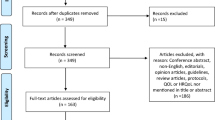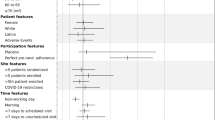Abstract
Purpose
Participants’ perception of quality of life (QOL) and respondent burden have significant implications for investigators’ ethical responsibilities to their subjects in phase I cancer trials. To address these responsibilities, analysis was conducted on participants’ views of their experiences of a phase I trial, including the associated burdens and what constitutes QOL.
Patients and methods
One hundred potential participants of the endostatin trial were surveyed. Sixteen of the 18 trial participants were interviewed extensively about their experiences on the trial.
Results
Participants described ‘normality’ as a baseline ability to function, be productive, and be free from symptoms of disease and side effects of treatment. Reflecting the relative nontoxicity of the study drug, participants contrasted their current QOL with their negative experience of previous cancer treatments and viewed their QOL as fairly good. However, participants emphasized that indirect and procedural burdens of trial participation had a significant impact on their current QOL.
Conclusions
Candid descriptions of a trial’s practical demands, in addition to potential physical complications in a trial, could improve the quality of informed consent.
Similar content being viewed by others
References
Agrawal M, Emanuel EJ (2003) Ethics of phase I oncology studies. Reexamining the arguments and data. JAMA 290:1075–1082
Lidz CW, Appelbaum PS (2002) The therapeutic misconception. Problems and solutions. Med Care 40(9):V55–V63 (Supplement)
Horng S, Grady C (2003) Misunderstanding in clinical research: distinguishing therapeutic misconception, therapeutic misestimation, and therapeutic optimism. IRB 25(1):11–16
Cohen L, de Moor C, Amato R (2001) The association between treatment-specific optimism and depressive symptomatology in patients enrolled in a phase I cancer clinical trial. Cancer 91:1949–1955
Campbell S, Whyte F (1999) The quality of life of cancer patients participating in phase I clinical trials using SEIQoL-DW. J Adv Nurs 30:335–343
Cohen L, de Moor C, Parker PA, Amato RJ (2002) Quality of life in patients with metastatic renal cell carcinoma participating in a phase I trial of an autologous tumor-derived vaccine. Semin Urol Oncol 7:119–124
Melink TJ, Clark GM, Von Hoff DD (1992) The impact of phase I clinical trials on the quality of life of patients with cancer. Anti-cancer Drugs 3:572–576
Moore S (2001) A need to try everything: patient participation in phase I trials. J Adv Nurs 33:738–747
Cox K (2000) Enhancing cancer clinical trial management: recommendations from a qualitative study of trial participants’ experiences. Psycho-oncol 9:314–322
Daugherty C, Ratain M, Grochowski E, Stocking C, Kodish E, Mick R, Siegler M (1995) Perceptions of cancer patients and their physicians involved in phase I trials. J Clin Oncol 13:1062–1072
Hutchinson C (1998) Phase I trials in cancer patients: participants’ perceptions. Eur J Cancer Care 7:15–22
Nurgat ZA, Craig W, Campbell NC, Bissett JD, Cassidy J, Nicolson MC (2005) Patient motivations surrounding participation in phase I and phase II clinical trials of cancer chemotherapy. Br J Cancer 92:1001–1005
Ulrich C, Wallen G, Feister A, Grady C (2005) Respondent burden in clinical research: When are we asking too much of subjects? IRB 27(4):17–20
Pentz RD, Flamm AL, Sugarman J, Cohen MZ, Ayers GD, Herbst RS et al (2002) A study of the media’s potential influence on prospective research participants’ understanding of and motivations for participation in a high-profile phase I trial. J Clin Oncol 20:3785–3791
Cohen MZ, Kahn D, Steeves R (2000) Hermeneutic phenomenological research: a practical guide for nurse researchers. Sage, Thousand Oaks, CA
Dowling M (2004). Hermeneutics: an exploration. Nurse Res 11(4):30–39
Barritt L, Beekman T, Bleeker H, Mulderij K (1984). Analyzing phenomenological descriptions. Phenomenol + Pedagogy 2(1):1–17
Author information
Authors and Affiliations
Corresponding author
Rights and permissions
About this article
Cite this article
Cohen, M.Z., Slomka, J., Pentz, R.D. et al. Phase I participants’ views of quality of life and trial participation burdens. Support Care Cancer 15, 885–890 (2007). https://doi.org/10.1007/s00520-007-0216-0
Received:
Accepted:
Published:
Issue Date:
DOI: https://doi.org/10.1007/s00520-007-0216-0




